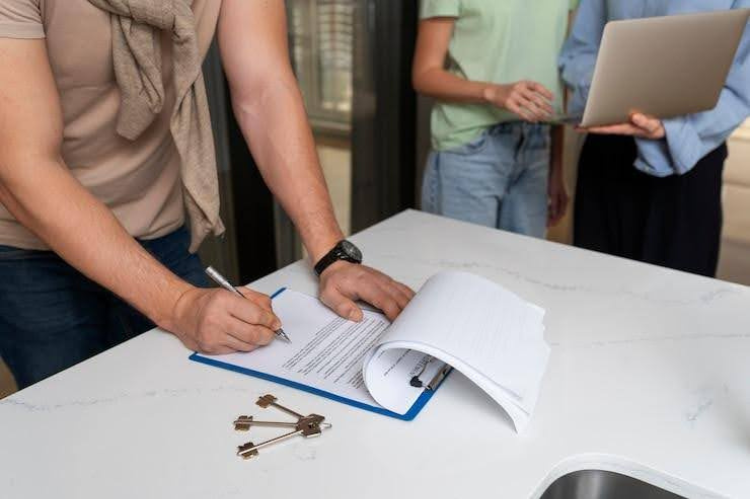Signing a rental agreement is one of the most important milestones you deal with when renting a property. It legally binds the landlord and tenant to a set of specific terms and conditions. This is why you need to take some time to carefully analyze the key roles and responsibilities outlined in the rental agreement. Read this article, and we will help you understand them in detail.
The Basics of Signing a Lease: What Every Renter Should Know
Before signing your name on a rental contract, you need to be aware of what its key components mean. Here are the basic terms that you will need to be aware of.
- Rental Costs
This covers your monthly rent amount, due date, and any additional expenses you’re responsible for, like parking fees or utilities. Know exactly what recurring costs you’re agreeing to pay before signing.
- Lease Duration
Typical agreements last 6-12 months. The contract should state a fixed end date for the rental term or if it auto-renews on a month-to-month basis.
- Security Deposit
Landlords require a deposit upfront that acts as a buffer for any damages during the rental. Understand when this is due, the conditions for refund after move-out, and your state’s deposit cap.
- Maintenance Responsibilities
Agreements outline if the tenant or landlord handles interior repairs based on the issue. Understand your obligations vs. what the owner covers. If you’re a landlord looking to save time and reduce stress, partnering with a trusted Atlanta property management company is a smart move.
- House Rules
Things like noise levels, guests, pets and other guidelines should be explicitly listed. Make sure you can comply with standards.
- Termination Notice
If you plan to move out when the lease ends, you’ll need to provide proper notice as outlined in the agreement – typically 30-60 days.
Reviewing these key sections and asking questions before committing to the rental term ensures there are no surprises down the road. Also, know that any verbal promises made should always be added to the contract before signing to protect your rights. Being an informed renter can help ensure a positive rental experience.
Guarantor vs Cosigner: What’s the Difference and Why It Matters

Many renters and borrowers often wonder about the difference between guarantor vs cosigner, especially when signing leases or loans. But what exactly is the difference between the two roles, and why does the distinction matter?
A guarantor acts as a backup payer on the rental contract, agreeing to cover financial obligations like rent or damages if the tenant defaults. Their role is meant to provide landlords with extra assurance. Guarantors are usually parents, relatives or family friends with good credit and higher financial means.
Meanwhile, a cosigner shares equal legal responsibility for upholding all terms outlined in the lease, including paying rent and complying with property rules. Essentially, the tenant and cosigner are jointly liable.
Going with a guarantor instead of a cosigner limits financial risk only to guaranteed amounts like rent. Meanwhile, cosigners carry more extensive liability beyond just defaulted payments, including any damages or violation fines assessed during the lease.
Make sure you understand exactly what type of third-party signer a landlord requires before asking someone to sign onto your rental agreement. Guarantors may charge a fee or require notarization to formalize the relationship. Provide complete transparency to avoid misunderstandings. No matter what, if a tenant violates lease terms, both guarantors and cosigners put their own credit and finances at risk, which could get messy.
Choosing the Right Support When Applying for a Rental

Finding someone to co-sign a lease with you as a renter requires careful thought. While having an additional signer can increase approval odds for an apartment or home rental, it also impacts the finances of that person if you can’t uphold your end of the contract. When searching for a cosigner or guarantor, keep these considerations in mind:
- Seek Someone with Strong Credit – Landlords want assurance that rent will consistently be paid each month. Asking someone with a proven credit history showing responsible repayment behavior is key, rather than damaging their good record.
- Pick a Stable Income Earner – The person co-signing should have steady employment or income streams to tackle expenses if you fall behind. Recent pay stubs showing reliable earnings provide landlords with a good source of confidence that the rent will be paid.
- Discuss Finances Upfront – Have an open conversation about the other person’s financial standing before asking them to sign onto your rental. Ensure they feel comfortable backing you based on your current income, debts, and savings in case covering you becomes necessary.
- Consider Family First – Turning to a parent or family member who knows you well and wants to provide rental opportunities you couldn’t secure alone may be a great option. Check with them first if they can manage the obligation without creating money issues or resentment towards you.
- Offer to Add Them to Your Policy – If your guarantor or cosigner does end up needing to pay some of your financial responsibilities, add them to your renter’s insurance policy to give them access if damages needing reimbursement occur. This provides more protection.
- Have an Action Plan – Do you have a backup action plan in case your chosen guarantor or cosigner encounters situations limiting their ability to cover you, like job loss or illness? Identify other possible candidates ahead of time so you don’t risk lease violation.
- Show Appreciation – Whether or not they ever need to pay anything on your behalf, frequently thank your co-signer for standing by your side and enabling your housing. Send small token gifts periodically for their support. Having someone co-sign a lease is a major favor and responsibility for them. Mitigating their risk wherever possible and making sure they genuinely want to back your rental financially prevents problems that could ruin your living situation or a relationship.
Final Words
Signing a lease or rental agreement enables exciting new living opportunities. However, it also creates legal and financial obligations for renters to prepare for. Knowing the typical key sections in rental contracts, weighing guarantor and cosigner differences, and thoughtfully choosing a responsible co-signer can set up both tenants and their backers for success. Entering a rental thoughtfully and collaboratively leads to positive outcomes for all.
Read Next: Quality Craftsmanship for Your Next Outdoor Project
Jessica Fuqua is a mom of two who writes about the messy, beautiful reality of raising kids. She believes parenting advice should feel like a conversation with a friend, not a lecture. When she’s not writing, she’s probably reheating the same cup of coffee for the third time.

